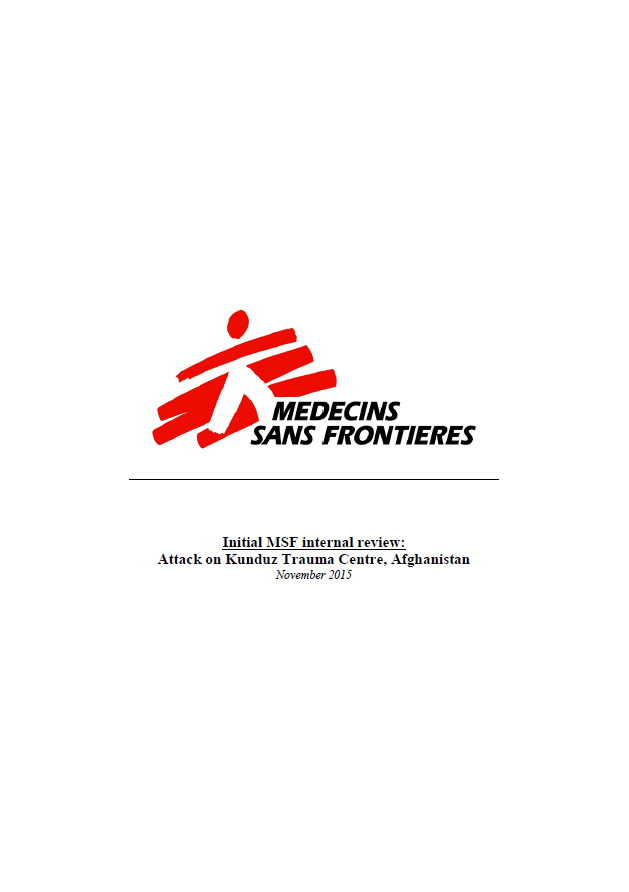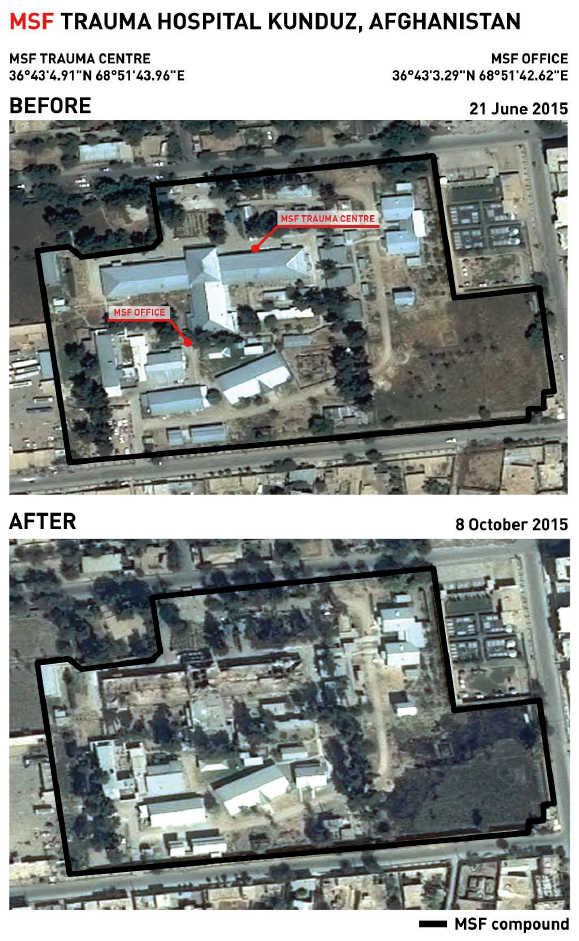The following document is an initial MSF internal review of the events leading up to, during and in the immediate aftermath of the airstrikes on the MSF hospital in Kunduz on Saturday 3 October 2015. This review is based on debriefings with MSF national and international employees, internal and public information, before-and-after pictures of the hospital including satellite images, emails and phone records. This review is an ongoing process and is not the final internal MSF report of events.
This document reviews the events in chronological order, including background information to our activities in Kunduz for those not familiar with the details of the project.
…
On Friday, two MSF flags were placed on the roof of the hospital, in addition to the existing flag that was being flown at the entrance to the Trauma Centre.8 The KTC was also one of the only buildings in the city that had full electricity from generator power on the night of the airstrikes.
In the hours before the airstrikes, MSF was contacted by French and Australian diplomatic officials and informed that MSF international staff in the KTC were at risk of being kidnapped. This alert came in addition to a request that had been received from French Embassy officials on Tuesday 29 September, where MSF was asked for the cell-phone details of its international staff in case of kidnapping. Included in the MSF team were two French nationals and one Australian national. The other nationalities of the international team were: Cuban, Malaysian, Hungarian, South African, and a Filipino. As part of MSF’s own assessment of risk, in-depth discussions were held with the MSF team in Kunduz, Kabul and at headquarters to evaluate the kidnapping risk. A decision was taken, based on an independent assessment of risk, to increase the security measures against kidnapping. All national and international staff that were not on duty were instructed to sleep in the safe-rooms in the basement and administrative office.
At 10pm, there were more than 100 MSF staff and caretakers sleeping in the basement below the intensive care unit (ICU) and inpatient department. This basement had been prepared as a safe dormitory in the event of clashes getting closer to the hospital. Those who were awake after 10pm report having noticed how calm the night was in comparison to the intense fighting of the previous days.
Throughout the night before the airstrikes began, all MSF staff confirm that it was very calm in the hospital and its close surroundings. No fighting was taking place around the hospital, no planes were heard overhead, no gunshots were reported, nor explosions in the vicinity of the hospital. Some staff mention that they were even able to stand in the open air of the hospital compound, which they had refrained from doing in the days prior, for fear of stray bullets from fighting in the neighbourhood around the hospital. All staff confirm that the gate of the hospital was closed and that the MSF unarmed guards were on duty.
…
According to all accounts the US airstrikes started between 2.00am and 2.08am on 3 October.
Despite it being in the middle of the night, the MSF hospital was busy and fully functional at the time of the airstrike. Medical staff were making the most of the quiet night to catch up on the backlog of pending surgeries. When the aerial attack began, there were 105 patients in the hospital. MSF estimates that between 3 and 4 of the patients were wounded government combatants, and approximately 20 patients were wounded Taliban. One hundred and forty MSF national staff and nine MSF international staff were present in the hospital compound at the time of the attack, as well as 1 ICRC delegate.
It is estimated that the airstrikes lasted approximately one hour, with some accounts saying the strikes continued for one hour and fifteen minutes, ending approximately 3am–3.15am.
A series of multiple, precise and sustained airstrikes targeted the main hospital building, leaving the rest of the buildings in the MSF compound comparatively untouched. This specific building of the hospital correlates exactly with the GPS coordinates provided to the parties to the conflict (GPS coordinates were taken directly in front of the main hospital building that was hit in the airstrikes).
When the first airstrikes hit the main hospital building, two of the three operating theatres were in use. Three international and twenty-three national MSF staff were caring for patients or performing surgeries in this same main building. There were eight patients in the ICU and six patients in the area of the operating theatres.
Those who survived the US airstrikes were direct witnesses of the attack from the different locations inside the MSF compound.
MSF staff recall that the first room to be hit was the ICU, where MSF staff were caring for a number of immobile patients, some of whom were on ventilators. Two children were in the ICU. MSF staff were attending to these critical patients in the ICU at the time of the attack and were directly killed in the first airstrikes or in the fire that subsequently engulfed the building. Immobile patients in the ICU burned in their beds.
After hitting the ICU, the airstrikes then continued from the east to west end of the main hospital building. The ICU, archive, laboratory, ER, x-ray, outpatient department, mental health and physiotherapy departments as well as the operating theatres were all destroyed in this wave after wave of strikes.
After the first strike, MSF medical teams working in the operating theatres ran out of the OT and sought shelter in the sterilisation room. The two patients on the operating table in the OTs were killed in the airstrikes.
The MSF international staff members sleeping in the administrative building were woken up by the sound of the first explosions. An MSF nurse arrived at the administrative building covered from head to toe in debris and blood with his left arm hanging from a small piece of tissue after having suffered a traumatic amputation in the blast. The MSF nurse was bleeding from his left eye and oropharynx. Immediate treatment was provided in an attempt to stabilise the nurse by the medical team in the administrative building.
…
Summary phone log of contacts MSF made during the US airstrikes
MSF made multiple calls and SMS contacts in an attempt to stop the airstrikes:
– At 2.19am, a call was made from MSF representative in Kabul to Resolute Support in Afghanistan informing them that the hospital had been hit in an airstrike
– At 2.20am, a call was made from MSF representative in Kabul to ICRC informing them that the hospital had been hit in an airstrike
– At 2.32am a call was made from MSF Kabul to OCHA Civil Military (CivMil) liaison in Afghanistan to inform of the ongoing strikes
– At 2.32am a call was made by MSF in New York to US Department of Defense contact in Washington informing of the airstrikes
– At 2.45am an SMS was received from OCHA CivMil in Afghanistan to MSF in Kabul confirming that the information had been passed through “several channels”
– At 2.47am, an SMS was sent from MSF in Kabul to Resolute Support in Afghanistan informing that one staff was confirmed dead and many were unaccounted for
– At 2.50am MSF in Kabul informed Afghan Ministry of Interior at Kabul level of the airstrikes. Afghan Ministry of Interior replied that he would contact ground forces
– At 2.52am a reply was received by MSF in Kabul from Resolute Support stating “I’m sorry to hear that, I still do not know what happened”
– At 2.56am an SMS was sent from MSF in Kabul to Resolute Support insisting that the airstrikes stop and informing that we suspected heavy casualties
– At 2.59am an SMS reply was received by MSF in Kabul from Resolute Support saying ”I’ll do my best, praying for you all”
– At 3.04am an SMS was sent to Resolute Support from MSF in Kabul that the hospital was on fire
– At 3.07am an SMS was sent from MSF in Kabul to OCHA CivMil that the hospital was on fire
– At 3.09am an SMS was received by MSF in Kabul from OCHA CivMil asking if the incoming had stopped
– At 3.10am and again at 3.14am, follow up calls were made from MSF New York to the US Department of Defense contact in Washington regarding the ongoing airstrikes
– At 3.13am an SMS was sent from MSF in Kabul to OCHA CivMil saying that incoming had stopped
– At 3.15am an SMS was received from CivMil OCHA stating that information had been passed to Resolute Support in the North and CJOC in Kabul as well as ANA in Kabul and the North
– At 3.18am an SMS was sent from MSF in New York to US Department of Defence contact in Washington that one staff was confirmed dead and many were unaccounted for


